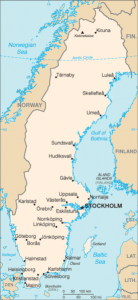Sweden’s Public Health Authority has launched a survey to measure and estimate how many in the community have had COVID-19. Blood samples are collected from laboratories in clinical chemistry and clinical immunology in nine regions: Jämtland, Jönköping, Kalmar, Skåne, Stockholm, Uppsala, Västerbotten, Västra Götaland and Örebro.

The collection takes place during eight weeks in the spring of 2020. A total of 1,200 samples are collected each week for analysis of antibodies. Antibodies show that the immune system recognizes the SARS-CoV-2 virus.
The analyzes for week 18 (a total of 1,104 analyzed samples) show, as expected, the largest proportion of positive antibody tests in Stockholm. A total of 7.3 percent of the blood samples collected from people in Stockholm were positive in the antibody study, which can be compared with a total of 4.2 percent in Skåne and 3.7 percent in Västra Götaland.
The numbers reflect the state of the epidemic earlier in April, as it takes a few weeks for the body’s immune system to develop antibodies.
Regarding age differences, the results show that COVID-19 antibodies were most common among people between 20 and 64 years. In total, 6.7 percent of the samples in this group were positive, which can be compared with 4.7 percent in the age group 0-19 years and 2.7 percent in the age group 65-95 years.
The antibody analyzes are done in collaboration with SciLifeLab / KTH.
Sweden has reported 33,459 cases and 3998 deaths to date.
- New Zealand reports one COVID-19 case in a week
- Brazil COVID-19: 2nd most cases in the world, Trump’s travel ban
- Canada: Fatal Lyme carditis case shows need for awareness of unusual symptoms
- Japan COVID-19: Plans to fully lift the state of emergency in Tokyo
- South Africa COVID-19 update: Mponeng gold mine closed, Don’t neglect malaria
- Vesicular stomatitis confirmed on more Texas premises


If you use the downtown Stockholm population of 975,904 and multiply it by the 7.3%, Stockholm had 91,240 cases, far more than the 33,459 total cases in Sweden identified in the article. If the article discussed the Metro Stockholm area, then the population is 2,377,081 and the affected population was 173,526.
Does it really matter.
These tests were carried out covering the weeks that Sweden claimed were the peak of their infections. For Stockholm, where 50% of Sweden`s cases are to return a result of 7.3% would leave their national antibody figure no higher than 5%. Same as the results from Spain who tested over 70,000 participants and who have lockdown. Same in France with a figure of 4.4%. For herd immunity 60%-70% is the absolute minimum. Sweden`s modelling figures for antibodies were over 300% off.
This policy is daily costing lives and from their own data herd immunity is a long way off. If ever.
It seems to me that if they didn’t fair any worse than countries that had lockdowns, that the extreme measures have been pointless. But maybe that’s just me.